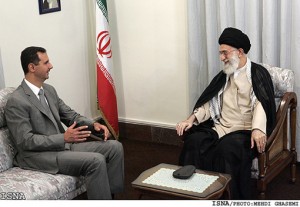Does Iran have a Syria Strategy?
via Lobe Log
 Iranian Foreign Minister Ali Akbar Salehi’s statement yesterday that the Islamic Republic is prepared to host talks between Bashar Al Assad’s government and the opposition should be regarded as an indication of Tehran’s inability to influence events in Syria. His public declaration was more like a futile public relations effort to sell Iran’s potential as a constructive regional player than a plan offered with any hope of its acceptance.
Iranian Foreign Minister Ali Akbar Salehi’s statement yesterday that the Islamic Republic is prepared to host talks between Bashar Al Assad’s government and the opposition should be regarded as an indication of Tehran’s inability to influence events in Syria. His public declaration was more like a futile public relations effort to sell Iran’s potential as a constructive regional player than a plan offered with any hope of its acceptance.
It is worth remembering that Salehi’s words come after calls from Russia and Kofi Annan for Iran to be included in Syrian crisis resolution efforts, followed by the Obama Administration’s categorical rejection of such an inclusion. Iran is apparently part of the problem and hence cannot be part of the solution. Susan Rice, the US ambassador to the United Nations, said yesterday that Iran “is supporting, aiding and abetting the Assad regime materially and in many other ways” and that “it has shown no readiness to contribute constructively.”
Exactly why Iran is distinguished from Russia regarding the distribution of material aid to the Syrian regime is not clear. One reason for the singling out of Iran could be because it is not a member of the UN Security Council. Or, it may be that the regional and international struggle over the fate of Syria is not geared towards delinking that country from Russia but rather about breaking its alliance with Iran. Iran cannot be permitted to take part in a process wherein the intention of several participants is to weaken its regional position.
But does Iran have an independent and coherent strategy for changing the calculations of the US and regional players like Saudi Arabia and Turkey? Or, for that matter, does Iran have a strategy to deal with the deteriorating situation in Syria? Not really!
Recent statements and slight shifts from Tehran suggest that Iran is towing the Russian line. In fact, Salehi’s offer of facilitating dialogue comes just a few days after Russia’s Foreign Minister Sergei Lavrov once again called on the Syrian government and all of the opposition groups to embark on a dialogue.
Iran also seems to have absorbed Moscow’s interpretation of the June 30th Geneva agreement regarding a Syrian political transition based on “mutual consent.” While for the Syrian National Council and Washington the first step of such a transition requires Assad’s departure, Tehran, like Moscow, wants Assad’s fate to be on the negotiating table. This implies that if there is a Russian decision to lean on Assad more forcefully, regardless of whether it will work or not, Tehran will follow.
Like other countries with a stake in Syria’s future, Iran is now faced with an ally that’s essentially in the throes of what will likely be a long, drawn out and worsening civil war. Various voices are warning about what could lie head. The prospect of Syria repeating the gruesome Algerian civil war of the 1990s has been raised, while for Mohammad Ali Sobhani, Iran’s former ambassador to Lebanon, the fear is more about Syria’s disintegration along the lines of the former Yugoslavia. Others worry about a spill over into and further destabilization of Iraq, particularly into the adjacent Iraqi provinces of Anbar and Ninewa. But expressions of fear do not make up for the lack of a visionary policy.
The Iranian government is undoubtedly aware that Syria is in a mess. But in the coming months expect Iran’s response to be more reactive than proactive despite proclamations and posturing that suggest otherwise.
En Español
The Latest
 From IPS News
From IPS News- Another Climate Victory in Europe… and Counting
- By Sending Nuclear Weapons to UK, Could US be Fueling Nuclear Proliferation?
- Small Island States Fostering Effective Energy Transition To Achieve a Blue Economy
- Attacks on UNRWA Not About Its Neutrality, Says UNRWA Chief
- US Foreign Policy in Middle East Still Governed by Israeli Priorities
- Rich Nation Hypocrisy Accelerating Global Heating
- Seeking Justice for the Civilian Victims of the Syrian Civil War
- Who Should be the Next UN Leader?PART 7 FINAL
- Will a Two-State Solution include Palestine as a UN Member State?
- UN Live’s CEO Katja Iversen Talks About the Power of Popular Culture and ‘Sounds Right’
- Online fundraising for IPS Inter Press Service at Razoo













